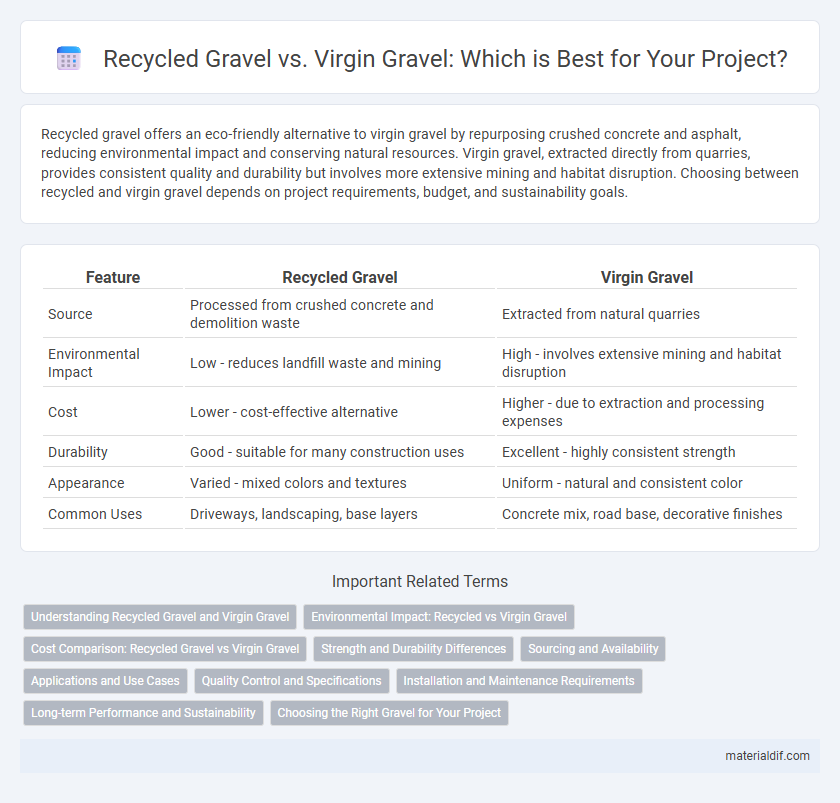Recycled gravel offers an eco-friendly alternative to virgin gravel by repurposing crushed concrete and asphalt, reducing environmental impact and conserving natural resources. Virgin gravel, extracted directly from quarries, provides consistent quality and durability but involves more extensive mining and habitat disruption. Choosing between recycled and virgin gravel depends on project requirements, budget, and sustainability goals.
Table of Comparison
| Feature | Recycled Gravel | Virgin Gravel |
|---|---|---|
| Source | Processed from crushed concrete and demolition waste | Extracted from natural quarries |
| Environmental Impact | Low - reduces landfill waste and mining | High - involves extensive mining and habitat disruption |
| Cost | Lower - cost-effective alternative | Higher - due to extraction and processing expenses |
| Durability | Good - suitable for many construction uses | Excellent - highly consistent strength |
| Appearance | Varied - mixed colors and textures | Uniform - natural and consistent color |
| Common Uses | Driveways, landscaping, base layers | Concrete mix, road base, decorative finishes |
Understanding Recycled Gravel and Virgin Gravel
Recycled gravel consists of crushed concrete, asphalt, or other reclaimed materials, offering an eco-friendly alternative with reduced environmental impact compared to virgin gravel, which is mined directly from natural deposits. Virgin gravel provides consistent size and composition ideal for construction projects demanding high structural integrity, while recycled gravel may vary in quality but supports sustainable building practices. Understanding the differences in source, durability, and application helps professionals choose the appropriate material for paving, drainage, or landscaping needs.
Environmental Impact: Recycled vs Virgin Gravel
Recycled gravel significantly reduces environmental impact by minimizing the need for quarrying, conserving natural habitats and lowering carbon emissions associated with extraction and transportation. Virgin gravel extraction disrupts ecosystems, produces higher greenhouse gas emissions, and contributes to soil erosion and landscape degradation. Utilizing recycled gravel supports sustainable construction practices by diverting waste from landfills and reducing resource depletion.
Cost Comparison: Recycled Gravel vs Virgin Gravel
Recycled gravel typically costs 30-50% less per ton compared to virgin gravel due to lower production and transportation expenses. Virgin gravel requires extensive excavation and processing, driving up its price, especially in regions with limited natural deposits. Choosing recycled gravel can significantly reduce project budgets without compromising the structural integrity required for construction and landscaping applications.
Strength and Durability Differences
Recycled gravel often exhibits lower strength compared to virgin gravel due to the presence of residual materials and potential contamination, which can compromise its load-bearing capacity. Virgin gravel, sourced directly from natural quarries, typically offers superior durability and consistent particle strength, making it ideal for high-stress construction applications. The difference in tensile strength and resistance to wear between recycled and virgin gravel significantly impacts their long-term performance in infrastructure projects.
Sourcing and Availability
Recycled gravel is sourced primarily from crushed concrete, asphalt, or other construction debris, making it widely available in urban areas with active demolition and construction projects. Virgin gravel, extracted directly from natural quarries, depends on geological deposits and regional mining operations, often limiting availability to specific geographic locations. The sourcing of recycled gravel supports sustainability by reducing landfill waste, while virgin gravel offers consistent particle size and quality due to controlled quarrying processes.
Applications and Use Cases
Recycled gravel offers sustainable benefits and is widely used in landscaping, driveways, and road base applications due to its affordability and environmental advantage. Virgin gravel, known for its consistent size and purity, is preferred in high-precision construction projects such as concrete mixing and airport runways. Both materials serve crucial roles, with recycled gravel excelling in eco-friendly groundwork and virgin gravel ensuring structural integrity in critical infrastructure.
Quality Control and Specifications
Recycled gravel undergoes rigorous quality control processes including screening, washing, and grading to meet industry specifications, ensuring it is free from contaminants and maintains consistent particle size distribution. Virgin gravel typically offers higher natural durability and uniformity, often preferred for projects requiring strict compliance with ASTM standards and mechanical property assessments. Both materials must satisfy engineering specifications for compressive strength, abrasion resistance, and gradation to be suitable for construction and landscaping applications.
Installation and Maintenance Requirements
Recycled gravel offers easier installation due to its compactable nature and consistency, reducing the need for extensive groundwork compared to virgin gravel. Maintenance requirements for recycled gravel are typically lower, as its angular particles lock together more firmly, minimizing displacement and weed growth. Virgin gravel, while aesthetically uniform, may require more frequent replenishment and leveling to maintain a stable surface over time.
Long-term Performance and Sustainability
Recycled gravel demonstrates enhanced sustainability due to its reduced environmental impact, lowering the demand for virgin aggregate extraction and minimizing landfill waste. Virgin gravel, while offering consistent strength and durability from natural sources, often involves energy-intensive quarrying practices that can degrade ecosystems over time. Long-term performance of recycled gravel can match virgin gravel when properly processed and tested, making it a viable, eco-friendly alternative in construction and landscaping projects.
Choosing the Right Gravel for Your Project
Recycled gravel offers an eco-friendly and cost-effective alternative to virgin gravel, making it ideal for landscaping, driveways, and construction projects where sustainability is prioritized. Virgin gravel provides consistent quality and strength, essential for structural applications such as concrete mixing and road base layers. Selecting the right gravel depends on project requirements, budget constraints, and environmental impact goals.
Recycled Gravel vs Virgin Gravel Infographic

 materialdif.com
materialdif.com